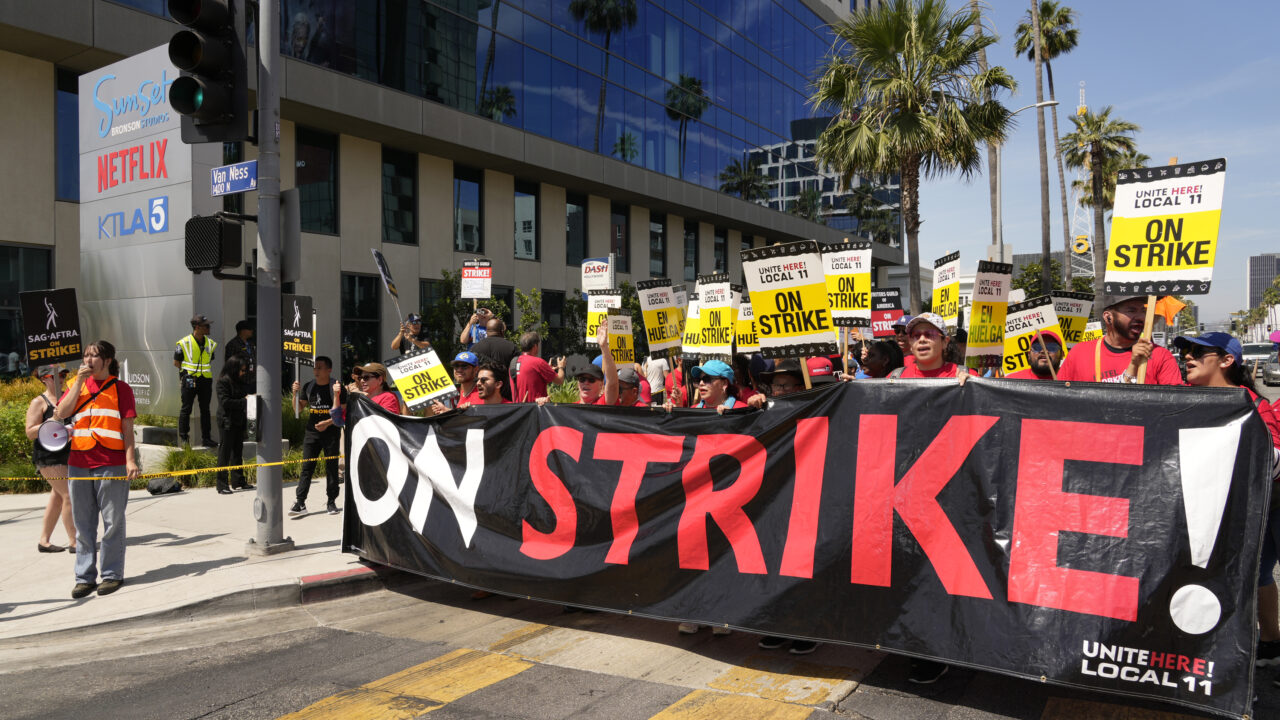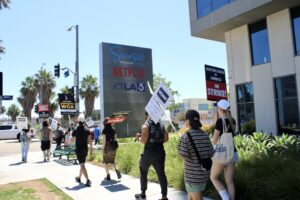Labor Politics in Black and Brown
As Latino immigration remakes the hotel industry, will L.A.’s storied hospitality union deliver on its promises to Black workers? Striking Hotel workers from Unite Here Local 11 join the picketing actors of SAG-AFTRA, and writers of the WGA, outside Netflix studios on July 21, 2023, in Los Angeles. (AP Photo/Chris Pizzello, File)
Striking Hotel workers from Unite Here Local 11 join the picketing actors of SAG-AFTRA, and writers of the WGA, outside Netflix studios on July 21, 2023, in Los Angeles. (AP Photo/Chris Pizzello, File)
The national labor movement revival of the last decade has roiled industries spanning car production to food delivery. In Los Angeles, strikes by actors and screenwriters have drawn the brightest spotlights, but the local vanguard of this year’s “hot labor summer” has also been held down by Local 11 of UNITE HERE, the 15,000-member hotel and restaurant union long known for its fierce advocacy of labor rights and social justice. Local 11 has lived up to its reputation, conducting rolling strikes and high-stakes walkouts across the city’s leisure industry since July, the same month as the start of the SAG-AFTRA strike.
Few members embody UNITE HERE’s uncompromising approach like the 67-year-old Baptist minister Donald Wilson, a retired hotel chef and 38-year veteran of Local 11. Originally from Texas, Wilson served as the union’s first organizing director of diversity programs between 2006 and 2020, when he retired. Wilson views worker empowerment as a kind of gospel, especially for Black folks. While supporting the union’s current demands for higher wages and better benefits, he’s also focused on making sure union leadership doesn’t shirk on its commitment to Black recruitment. “This is the moment the union needs to step up and put its money where its mouth is for Black workers,” says Wilson, who is plainspoken and passionate. “While the iron is hot.”
There really shouldn’t be a fight on this front. Local 11 has recognized the issue of Black recruitment since 2006, when then-president Maria Elena Durazo added contract language that called for a task force — made up of representatives from the union, the hotels and the community, and an ombudsman — to recruit and oversee Black hiring. (Wilson spearheaded the community representation.) The new provision addressed a serious problem: Starting in the late ’80s, UNITE HERE had seen a precipitous drop in Black hotel workers as waves of largely Latino immigration remade the service industry, including hospitality. Since beginning his career in 1974, Wilson witnessed this demographic shift firsthand. Although personally secure in his own position at the Century Plaza Hotel, he grew increasingly discomfited by hotel hiring practices that he saw as deliberately freezing out Black hires.
What had long been a personal campaign to bolster Black hiring became part of a wider push for Black economic justice — one that Wilson believes needs to happen now, driven by UNITE HERE.
As inequality mushroomed in the ’90s and into the aughts, the dearth of jobs, and especially good union jobs, for Black people became harder to ignore. Yet L.A. institutions, notably unions, had little appetite for addressing or even acknowledging the growing racial hiring gaps, fearful of stoking interethnic tensions or breaking the momentum of a revitalized labor movement built on a sector that was increasingly immigrant and Latino.
The union’s 2006 provision was a welcome sign of change, but it soon came under threat. During 2018 contract negotiations with an Orange County hotel, the provision was weakened — “the canine teeth taken out if it,” as Wilson says. In the new contract, the task force overseeing Black hires became optional, and community participation on the task force was scuttled. While the changes didn’t technically apply to all the hotels covered by Local 11, Wilson saw it as a bad sign, an unraveling of an important thread that deserved defending and being made stronger.
Just as concerning, Wilson was not consulted about the change. In 2018, he started a one-man campaign within the union to pressure leadership to restore the original language, in the process becoming more vocal and somewhat less diplomatic than he’d been in the past. In 2020, the COVID pandemic hit, hotel work imploded virtually overnight and Wilson, seeing the writing on the wall, took a retirement package. His beef with his union, like so much else, was paused.
Three years later, COVID has receded enough that the hotel and restaurant business has come roaring back, with major tourist events like the 2026 World Cup and 2028 Olympics on the horizon. Wilson is no longer working, but is more determined than ever to ensure that Black workers are a part of the expansion. (The racial justice protests that exploded after George Floyd’s murder in 2020 helped fuel that determination, or refuel it.) What had long been a personal campaign to bolster Black hiring became part of a wider push for Black economic justice — one that Wilson believes needs to happen now, driven by UNITE HERE. “I’m enjoying my retirement, but in terms of the union, I can be an advocate or I can be an adversary,” he says. “Right now, I’m an adversary.”
If his advocacy has become a tricky sell within the union, it’s been an even trickier sell among Black people who may applaud the principle of equal access, especially in Latino-dominated jobs, but balk at the idea of hospitality being the work of the future. Black people spent many years trapped in domestic work such as cooking, cleaning and serving, and some still equate the industry with regression, or at least a failure of imagination. Wilson understands the criticism, but disagrees. Maybe hospitality isn’t high tech, he says, but it’s an industry on an upward trajectory, offering good-paying — hopefully, by the end of the strike, even better-paying — jobs that can put a floor under an American dream that for many has worn very thin.
“Black people did hospitality work for 400 years for free, as slaves,” says Wilson. “We need to get hired now, when the money’s good.” Put another way, the work that once hemmed Black people in can now help them get to where they want to go.
Wilson says he’s concentrating on boosting morale so that hospitality workers of all colors in all places will continue to agitate for better wages and treatment.
It’s encouraging that Wilson and the union are not far apart. He and a cadre of local Black leadership in L.A. called the African American Labor Oversight Coalition are mostly satisfied that the proposed contract restores the Black-hire plan that had been there in ’06 — but not fully. Just before the strike kicked off, the coalition sent a letter to the local asking for two edits to the contract: monthly task force meetings for the first six months, and a requirement that the union collaborate with Black community members in choosing the task force’s community representative — i.e., the role long performed by Wilson. These may seem like minor bureaucratic details, but Wilson says that’s where the devil resides. The tweaks, he says, are necessary if the union really wants to grow and institute Black hiring and deliver on a commitment that goes beyond diversity public relations. Black people “can’t afford that any more,” says Wilson.
For its part, Local 11 says its commitment to Black hiring has never wavered. Chapter co-president Kurt Peterson points out that the proposed contract features strengthened language around diversity hiring policies, and that the union has added new anti-discrimination requirements for employers, such as rules relating to applicants with prison records. Peterson also points to the union-backed gains made for the workforce at So-Fi stadium, a development project with significant Black employment, and for Black workers at the small but symbolically important Chateau Marmont Hotel on Sunset Boulevard. Still, he admits the Black numbers in hospitality are “dismal.”
“We couldn’t agree more with Donald Wilson,” says Peterson. “Black numbers need to go up. We want the same things.”
The union has so far rejected the Black coalition’s requests to further augment the proposed contract, but Wilson is unfazed — and busy. Shortly after retiring in 2020, he founded Black Hospitality Workers, an organization dedicated to continuing the fight for equity in hospitality in L.A. and elsewhere. As a BHC volunteer, he makes regular trips to his native Texas to work with UNITE HERE’s Local 23, which represents workers throughout right-to-work Texas, as well as Denver, Atlanta, New Orleans, Washington D.C. and Baltimore. His dream is to establish a union presence in his hometown of Galveston, an island destination with a surplus of hotels, and a distinct lack of pro-labor activity.
Wilson says he’s concentrating on boosting morale so that hospitality workers of all colors in all places will continue to agitate for better wages and treatment. The mission, he says, is not just racial or economic; it is also spiritual. “My assignment is to bring together pastors and whole communities for this cause,” Wilson says. “Accountability and sustainability, that’s the holy grail. That’s what’s been so hard to get, that we’ve got to have.” Having it here would provide nothing less than divine inspiration. Says Wilson, “They’re all looking to L.A. to see what’s next.”
Your support matters…Independent journalism is under threat and overshadowed by heavily funded mainstream media.
You can help level the playing field. Become a member.
Your tax-deductible contribution keeps us digging beneath the headlines to give you thought-provoking, investigative reporting and analysis that unearths what's really happening- without compromise.
Give today to support our courageous, independent journalists.






You need to be a supporter to comment.
There are currently no responses to this article.
Be the first to respond.